Stories from the My Story Matters Campaign

Read some of the stories submitted to the North Carolina Council on Developmental Disabilities through its My Story Matters campaign. The campaign provides a way for people with intellectual or other developmental disabilities (I/DD) to share their story.
Want to share your story? Sharing your story is an impactful way to educate and inform key decision makers, lawmakers, and others who can help make life better for people with I/DD in North Carolina. You can share your own story in your own words by completing an easy-to-use online form! Learn how to submit your story
Adam Strom from Wake Forest, NC
Through the North Carolina Innovations Medicaid waiver, Adam benefits from essential supports that help him with daily activities such as bathing, dressing, household chores, and employment and is developing independent living skills for the future. At age 28, Adam lives with his parents, who are in their 60s. He will need continuous support over his lifetime as he faces these challenges alone. His parents are deeply concerned about his transition to independent living while also managing their own financial challenges related to retirement and healthcare costs. Adam’s parents envision a future where he fully and independently lives his best life in his own place, supported by paid caregivers, professionals, friends, and his faith community. They want him to continue his competitive integrated employment at Cambridge Village of Apex, where he is respected and valued. All of this is made possible through Medicaid funding which is essential for Adam’s care and support. |
Anthony Young from Franklinton, NC
When time allows, I advocate for accessibility and reliable transportation for people with disabilities. I am a member of the Strategic Involvement Committee (SIC) for the Greensboro Transit Authority (GTA). We gather monthly to discuss how to better serve the paratransit community. These are such critical issues in the I/DD community. Medicaid is so very important for our disability community! We must have it funded! |
Cheryl Powell from Wilmington, NC
We need to discuss the direct support professionals (DSPs) who make these supports possible. I have over ten years of experience working as a DSP so I am quite familiar with the role. They are the backbone of our system, supporting people with disabilities every single day. Too often, they are overworked, underpaid, and lack proper training—and in some cases, adequate respect. Ensuring funding for the Innovations Waiver waitlist and investing in DSPs are not just moral imperatives—they are investments in the future of our communities. When people with disabilities can lead fully productive lives everyone benefits. But to get there, we need action, funding, and commitment. Together, we can build a future where everyone, regardless of ability, is truly supported. |
Demi Eckhoff from Durham, NC
I moved independently from Alabama to North Carolina in 2016 to receive my master’s in public health-registered dietetic training at UNC - Chapel Hill. Currently, I serve patients with eating disorders and other chronic health issues as a part-time dietitian. I pay taxes now and am a productive and influential individual in my community. In the fall, I will be attending John’s Hopkins University online, working towards my Doctor of Public Health with a concentration in Health Equity and Social Justice. Through Medicaid, I received an Innovations Waiver after having to hospitalize myself in order to get it. You may say that this is a drastic measure, but this is what it takes in order to receive equitable, independent care for someone with a significant disability. It costs Medicaid more money for me to be hospitalized than it is for me to live and thrive in my community independently. If my services were stripped away from me, due to these proposed budget cuts, I would be forced into a Long-Term Acute Care Facility due to my ventilator. This would cost taxpayers significantly more money than keeping me in the community. I urge you to preserve funding for Medicaid. |
Jeffrey Olander from Raleigh, NC
For years, I have fought an impossible battle to secure the skilled nursing care I need to safely remain in my home. I require 12 hours of care every night, seven days a week, yet despite working with three different staffing agencies in the last five years, not a single nurse has joined my case. Instead, I have watched my care team dwindle. Today, I have just one nurse left—someone who has been with me since 2016. If he were to leave, I don’t know what I would do. I live with my single, elderly mother, who, despite her love and dedication, can no longer perform most of my daily care. To fill the growing gaps, I have been paying out of pocket for unskilled caregivers (CNAs), just to survive. But this is not a sustainable solution. I fear that without access to the nursing staff I am entitled to, my health will be put at serious risk, or worse—that I will be forced into an institution simply because I cannot get the care I need at home. I am not asking for special treatment. I am asking for action—for policies that ensure Medicaid PDN recipients can actually access the care the program promises. Without immediate reform, people like me will continue to fall through the cracks. Please help me stay in my home, maintain my dignity, and live as full a life as possible. |
Jon D'Angelo from Raleigh, NC
I am an East Carolina University graduate.I work full-time with an insurance broker out of Atlanta. I am on the waiting list for the Innovations Waiver. Currently, 2/3rds of my care is done by my aging parents. I have Spinal Muscular Atrophy type 2.I need physical assistance with most activities of daily living.I have CAP-DA, but it doesn’t provide the hours needed to avoid a care crisis.If I go into a care crisis because of DSP pay or the waiting list, everythingI’ve worked to achieve professionally and personally will be completely destroyed.Most 36-year olds with a Master’s degree don't fear going into a nursing home, but I do, and it is something I’ve feared since my freshman year at ECU. The two top policy education priorities for NCCDD are to (1) increase Innovations Waiver slots. 2,000 additional slots each year for the next 8 years is needed to end the waiting list, and (2) increase Direct Support Professional (caregiver) Wages to Ensure a Sufficient Workforce. |
Jonathan Ellis from Murfreesboro, NC
I have to depend on aging parents (my mother is 78, and my father is 79) when there is no staff coverage for my Innovations hours, and it takes both them to do what 1 Direct Support Professional could do in about 2 hours. Tasks could take up the entire day with my parents. Even if my hours are covered by staff, my parents don’t want me left alone for emergencies. What do I do when they are no longer here on this earth? I am my own guardian, and I do not want to be placed in an intermediate care facility (ICF) or a group home for that matter. With the support of my direct support professional team that I have around me, I am able to go out to the community and to work and play and visit with friends. Without these wonderful people, I would be stranded in my own home. |
Kay McMillan from Cary, NC
I want to be able to create change for individuals with disabilities, and I saw joining the Council as another way that I could make positive change for people with intellectual or other developmental disabilities (I/DD) and their families. I am the co-founder of a small nonprofit, Youth LEAD NC, that equips young people with disabilities in North Carolina with the skills they need to lead full and independent lives. I believe it is crucial that individuals living with I/DD have the self-determination to make decisions regarding their own lives as much as possible. Any initiative that promotes the autonomy of people with disabilities and encourages collaborative decision-making is a step in the right direction. For me, having services through Medicaid allows me to live in my own apartment, have a job that I love, and participate in activities in my community! I rely on Medicaid. |
Matt Potter from Pfafftown, NC
Additionally, I am employed as an E-Badge Reviewer for the National Association of Direct Support Professionals (NADSP). I have a Bachelor of Arts in English from Wake Forest University and I am 2011 graduate of North Carolina Partners in Policymaking, among other professional and advocacy development certifications. I am currently receiving CAP-DA services, and I am on the NC Registry of Unmet Needs and have been since 2009. The current services that I receive are imperative for me to continue to work and contribute to my community. If not for these Medicaid-funded services, I would likely end up in a congregate living setting. My being in an institutional care setting would not only reduce my value to the community, but it would also cost the State more money to maintain. |
Nicholas and Ray Hemachandra from Arden, NC
Nicholas is autistic and intellectually disabled. He has severe mixed expressive-receptive communication disorder. He is medically at-risk and immunocompromised—co-occurring conditions are common for people with IDD. He has severe ulcerative pancolitis, and he had a stroke. He had significant self-injuring behaviors as a child, behaviors that spiked when he was bullied in school by other children. Nicholas began receiving the Innovations Waiver, which was then called a CAP waiver, in 2010. He’s now had direct care workers who connect him to the community for 15 years. Having Medicaid also means his medical complications can be addressed appropriately. Nicholas works part-time at Annie B’s, a local ice cream shop; he volunteers at MANNA FoodBank and Asheville-Buncombe Community Christian Ministry. His volunteering expanded even more for 5 months after Hurricane Helene to help out his community and people in need. He participates in Asheville City recreational programs and other social groups, swims and takes classes at the Y, and he has become a truly exceptional juggler. His Innovations support workers contributed to all of this. |
Rebecca Putnam from Asheville, NC
I work at a residency clinic (MAHEC, Mountain Area Health Education Center) teaching the next generation of doctors. While teaching residents, I also serve as the Director for the Adult I/DD Consult Clinic and am the Medical Director of the Acute Care Clinic. We know that physicians across the country do not get training on how to care for adults with intellectual disability. I'm trying to teach these resident physicians how to take better care of people like my brother. Medicaid expansion has been life-changing for so many of my patients with and without disabilities. It has helped many families of people with disabilities take care of their health needs so that they can take care of their loved ones. I've had so many people in my office crying about the possibility of losing their Medicaid. During Hurricane Helene, so many people in Western NC lost their jobs, homes, and livelihoods related to Helene, but the ability to at least get healthcare through Medicaid is very important. |
Ryan and Nicole Rotundo
I am the younger brother of Nicole Rotundo, a 41-year old woman with Down syndrome. Siblings are the longest relationship that someone with I/DD will have in their life. Siblings will be an integral part of the long-term support for someone with I/DD. Nicole is very active in her local community in Asheville, enjoying Open Hearts Art Studio, dancing with friends, making jewelry, and more. Having support during Hurricane Helene was critically important for Nicole as she, like all of us, dealt with the trauma and destruction from the disaster. In my work with NDSS, I talk with people often who are concerned about maintaining funding for Medicaid. This funding is vitally important for healthcare coverage, for home and community-based support services, for employment support, and more. My top policy priorities for people with intellectual and developmental disabilities are: increase Innovations Waiver slots, and increase pay for Direct Support Professional (caregiver) so that there is not so much change in staff, and they can afford to continue working longer. |
Sam Henning from Raleigh, NC
I attended UNC-Greensboro in the Beyond Academics program.I got an Innovations Waiver slot during that time after I was on the waiting list for TEN Years. I have two part-time jobs.I love my jobs!I never miss work.I have about 12 hours of support from a direct support person.I love music and working out.I am the biggest Wolfpack fan around. I feel valued in my community.I love living on my own – with my wife.I am glad I have a support person.We cook and clean and do all sorts of things together. Please let more people get on the Innovations Waiver.Some might need “just a little bit” of support, and it will really help them to live more independently. |
Tiffany Williams from Boone, NC
Our daughter June is a great example. We just funded her 529 for this year, along with her brother’s—we’re hoping she goes to college, and we think that she will. Our hopes, clearly, are high. And we’re doing our best to financially support her and make sure she has social supports in place to make that good life possible. We want to also be able to count on Medicaid for her healthcare needs and for support to live in a community, not an institution. We live in Boone, and I think Helene showed everyone in the high country that you can't plan everything, and your safety net can be washed away. With one storm, we watched our neighbors lose their homes and life savings to try to recover what was lost. The security and peace of mind it would give parents of kids with disabilities that they would have the bare minimum supports to succeed in place are priceless. And when people with disabilities have the resources to thrive and contribute to their community, everyone wins. I am hopeful that when you are considering what to fund this session, that you will remember my daughter June, who loves preschool and wants to be a dentist, or maybe an astronaut. And keep Medicaid funded. |
Tony Hall from Raleigh, NC
Outside of work, I enjoy trying new recipes, playing with my dog, participating in adaptive recreational activities, attending and participating in poetry events, and spending time with friends. For the disability community, Medicaid is the difference between being able to receive necessary medical care and having those needs go unmet. For people with I/DD and many of the job seekers whom I support, Medicaid is critical for funding community-based support services. |
Yvonne Bell from Charlotte, NC
I’m into history, politics, current events, psychology, weather, astronomy, disability advocacy, all things British, and random trivia. I advocate on the Autism Advisory Board of the Autism Society of North Carolina and participate in Think Tank (an autism group) meetings. I also participate monthly in NCCDD’s Self-Advocate Discussion Series. |
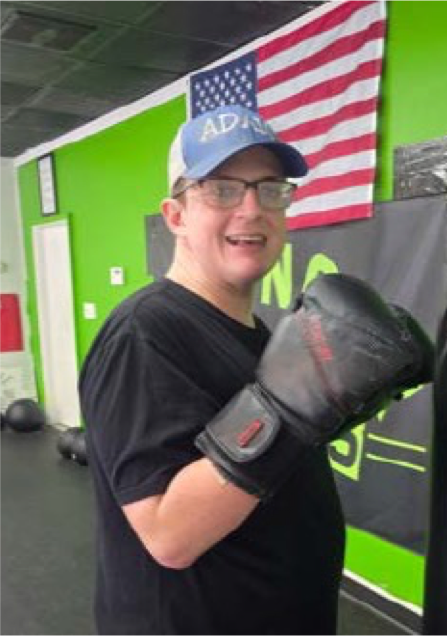 Adam Strom is a vibrant and joyful young man with Fragile X Syndrome, a genetic condition affecting his learning, behavior and social interactions; he experiences cognitive and developmental delays requiring lifelong support, including sensory sensitivities and socialization difficulties due to Fragile X and Autism. He enjoys singing with his favorite music videos, weekly workouts at the gym with a personal trainer, and playing Bingo on Zoom with friends from across the country. He stays in touch with his friends with disabilities through bi-weekly virtual meet-ups to strengthen and build a sense of community. His infectious enthusiasm and hugs delight everyone he meets.
Adam Strom is a vibrant and joyful young man with Fragile X Syndrome, a genetic condition affecting his learning, behavior and social interactions; he experiences cognitive and developmental delays requiring lifelong support, including sensory sensitivities and socialization difficulties due to Fragile X and Autism. He enjoys singing with his favorite music videos, weekly workouts at the gym with a personal trainer, and playing Bingo on Zoom with friends from across the country. He stays in touch with his friends with disabilities through bi-weekly virtual meet-ups to strengthen and build a sense of community. His infectious enthusiasm and hugs delight everyone he meets.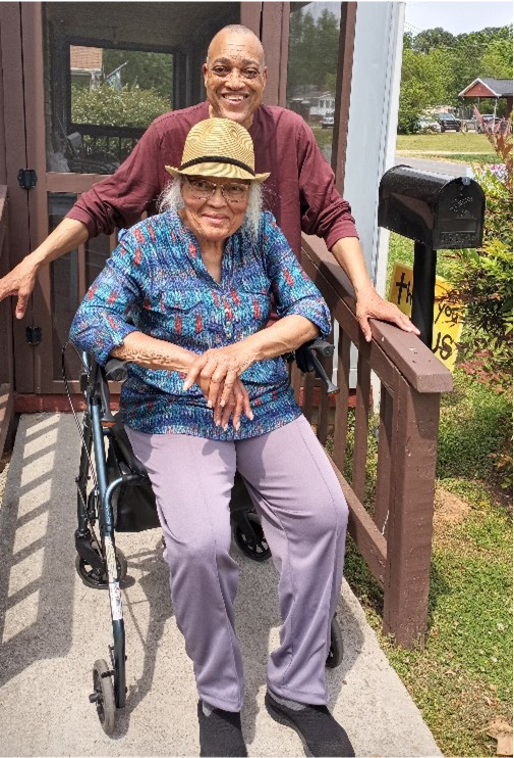 I am an African American man, self-advocate, and caregiver, the third of five children. I was born with cerebral palsy. My two older siblings have passed away; now I serve in the role of big brother to my two younger siblings. After our mom had a major stroke four years ago, I moved home to help take care of her, until her passing in December 2024. That was needed because my two younger siblings were not able to retire early, and we did not want our mom to go into an assisted living facility.
I am an African American man, self-advocate, and caregiver, the third of five children. I was born with cerebral palsy. My two older siblings have passed away; now I serve in the role of big brother to my two younger siblings. After our mom had a major stroke four years ago, I moved home to help take care of her, until her passing in December 2024. That was needed because my two younger siblings were not able to retire early, and we did not want our mom to go into an assisted living facility.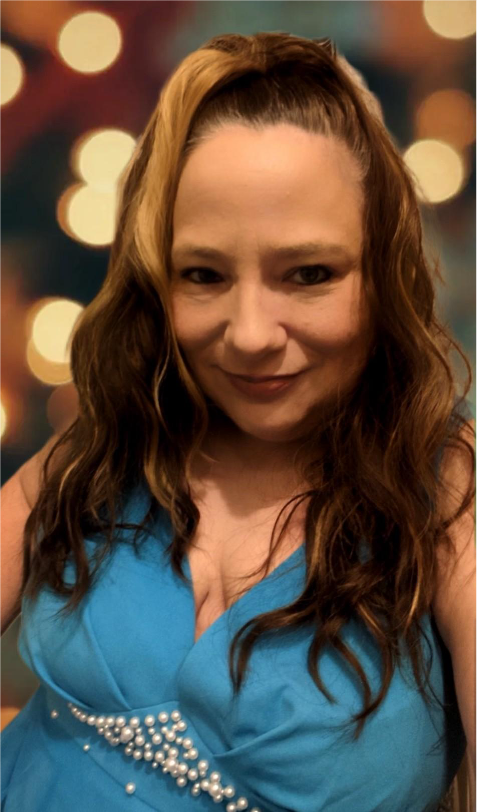 My name is Cheryl. I’m married to the love of my life, Billy, and I have Cerebral Palsy. I am responding as a self-advocate, not just for myself but for so many people with disabilities across North Carolina who deserve the chance to live with dignity. Right now, there are over 18,700 people on the Innovations Waiver waitlist while there are only 14,000 who have a Medicaid Innovations Waiver slot. Being on the waitlist can last years, even decades, holding us back from accessing vital services that promote independence and respect. These waivers aren't just red tape or a line on paper; they are lifelines. They provide personal care, job supports, community integration—services that allow people like me to live meaningful lives. But for many this waitlist feels like being told their lives are on hold or worse.
My name is Cheryl. I’m married to the love of my life, Billy, and I have Cerebral Palsy. I am responding as a self-advocate, not just for myself but for so many people with disabilities across North Carolina who deserve the chance to live with dignity. Right now, there are over 18,700 people on the Innovations Waiver waitlist while there are only 14,000 who have a Medicaid Innovations Waiver slot. Being on the waitlist can last years, even decades, holding us back from accessing vital services that promote independence and respect. These waivers aren't just red tape or a line on paper; they are lifelines. They provide personal care, job supports, community integration—services that allow people like me to live meaningful lives. But for many this waitlist feels like being told their lives are on hold or worse. 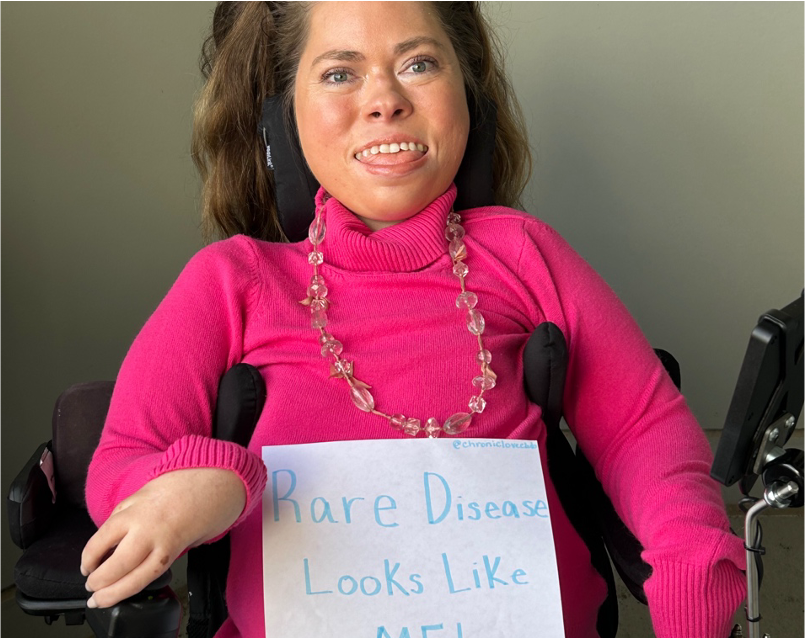 I was born with a rare form of congenital muscular dystrophy. I rely on a non-invasive ventilator throughout the day as well as a feeding tube for all hydration and supplemental nutrition.
I was born with a rare form of congenital muscular dystrophy. I rely on a non-invasive ventilator throughout the day as well as a feeding tube for all hydration and supplemental nutrition. 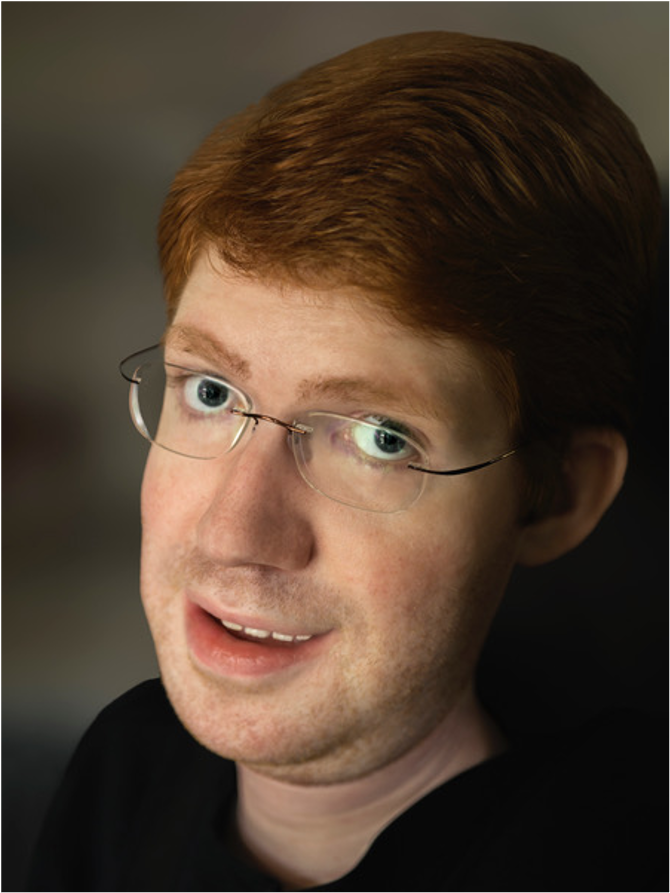 I have been a participant in the Medicaid Private Duty Nursing (PDN) program for my entire adult life—20 years. I am not just someone navigating the system, but I am also someone who is struggling against its failure.
I have been a participant in the Medicaid Private Duty Nursing (PDN) program for my entire adult life—20 years. I am not just someone navigating the system, but I am also someone who is struggling against its failure.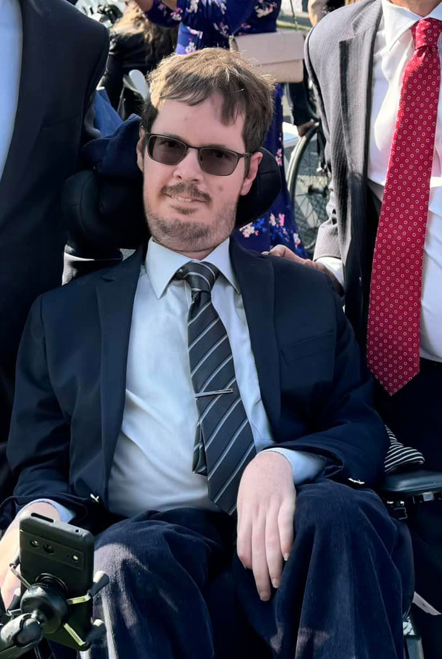 I am a member of the North Carolina Council on Developmental Disabilities.I was appointed by the Governor in December 2022. I currently serve as Chair of the Council.
I am a member of the North Carolina Council on Developmental Disabilities.I was appointed by the Governor in December 2022. I currently serve as Chair of the Council. 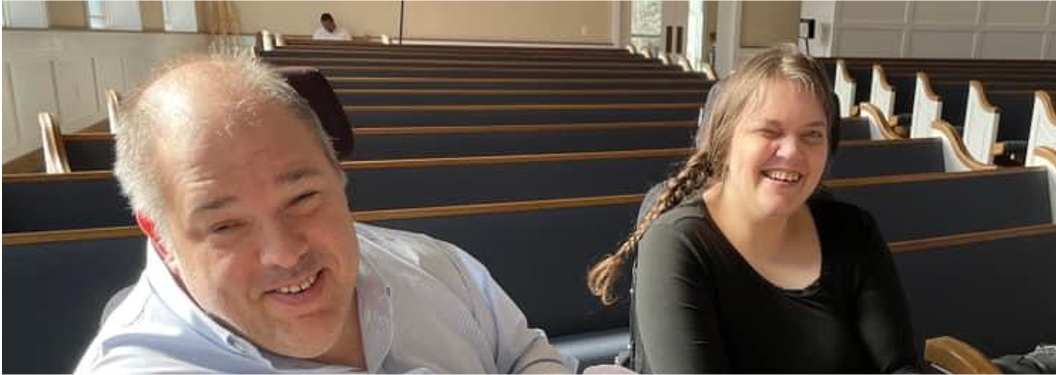 I am a 52-year-old young man with Cerebral Palsy, which is a developmental disability. I am from Murfreesboro, NC and Hertford County. I am one of the few who is lucky enough to benefit from an Innovations Waiver system slot.
I am a 52-year-old young man with Cerebral Palsy, which is a developmental disability. I am from Murfreesboro, NC and Hertford County. I am one of the few who is lucky enough to benefit from an Innovations Waiver system slot. 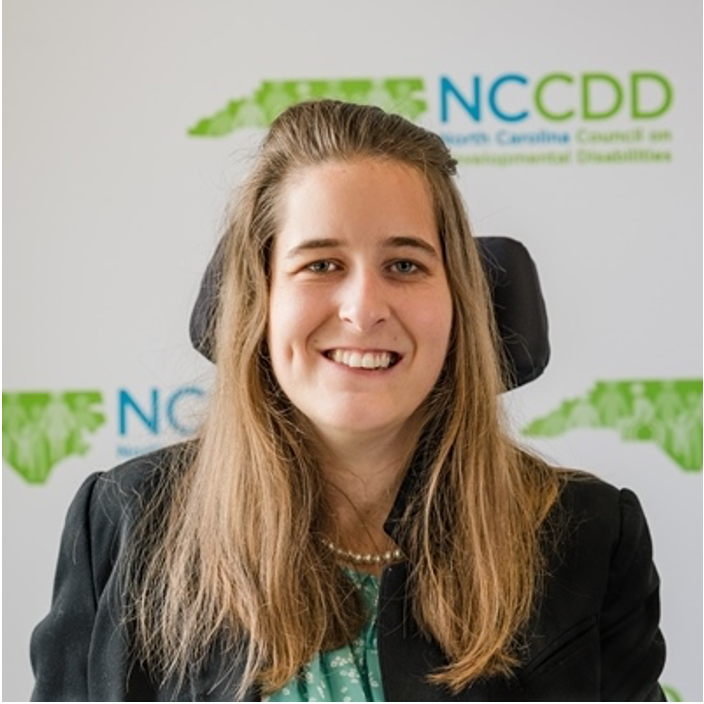 I am a graduate of NC State University with a bachelor’s degree in Political Science and minors in Accounting and Nonprofit Studies. I live in my own apartment in Cary, NC. In my spare time, I enjoy playing boccia ball every Sunday.
I am a graduate of NC State University with a bachelor’s degree in Political Science and minors in Accounting and Nonprofit Studies. I live in my own apartment in Cary, NC. In my spare time, I enjoy playing boccia ball every Sunday.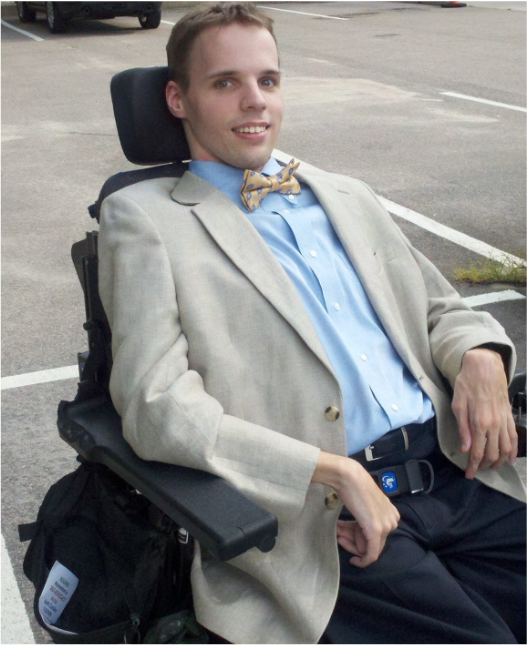 I am employed as a Consultant with Centered Resources, (formerly, Community Bridges Consulting Group). I consult primarily on stakeholder engagement and advocacy, and I regularly serve as a speaker and trainer. Born with Cerebral Palsy, I decided very early on to rise above my challenges and help others to do the same. Having been a public speaker and advocate for people with disabilities for over 20 years, I have been a tireless, sought-after trainer and advocate for the I/DD Community, both in NC and nationally.
I am employed as a Consultant with Centered Resources, (formerly, Community Bridges Consulting Group). I consult primarily on stakeholder engagement and advocacy, and I regularly serve as a speaker and trainer. Born with Cerebral Palsy, I decided very early on to rise above my challenges and help others to do the same. Having been a public speaker and advocate for people with disabilities for over 20 years, I have been a tireless, sought-after trainer and advocate for the I/DD Community, both in NC and nationally. 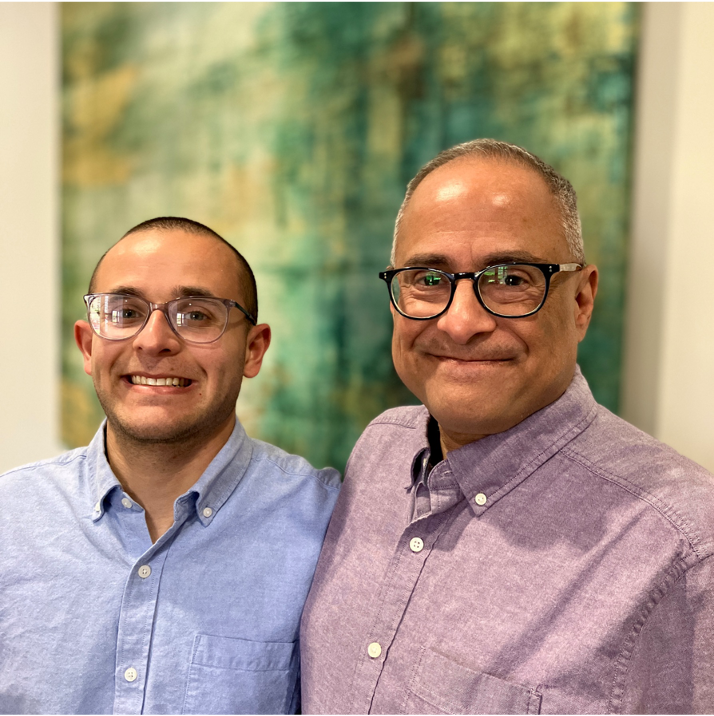 Nicholas Hemachandra is a kind, loving, and entirely good man. He’s 24 years old. We live together in an apartment in Arden in Buncombe County, and he is an example of the powerful difference the Innovations Waiver can make in the life of a person with IDD.
Nicholas Hemachandra is a kind, loving, and entirely good man. He’s 24 years old. We live together in an apartment in Arden in Buncombe County, and he is an example of the powerful difference the Innovations Waiver can make in the life of a person with IDD.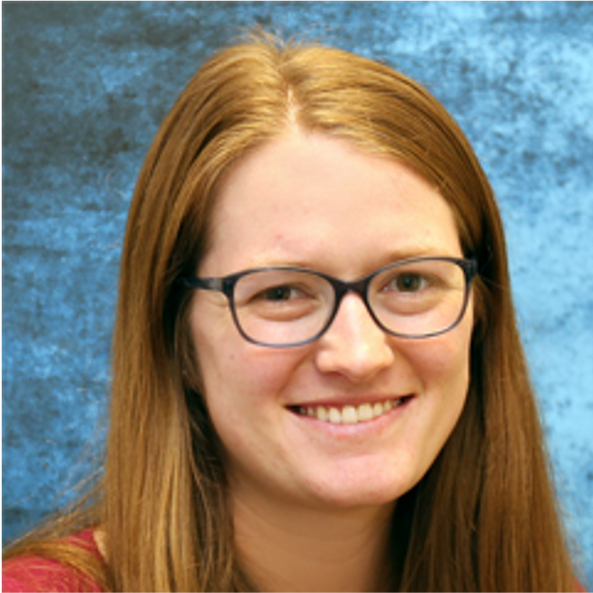 I am a mom of two; I love to hike in Western North Carolina. I believe strongly that everyone deserves access to healthcare. Most importantly, my passion is for people with intellectual disabilities. On July 1st, 2021, I was appointed to the North Carolina Council on Developmental Disabilities.
I am a mom of two; I love to hike in Western North Carolina. I believe strongly that everyone deserves access to healthcare. Most importantly, my passion is for people with intellectual disabilities. On July 1st, 2021, I was appointed to the North Carolina Council on Developmental Disabilities. 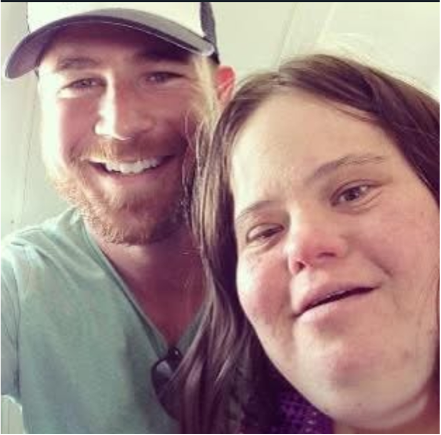 I am a member of the North Carolina Council on Developmental Disabilities, appointed by the Governor in 2018, and I serve on the Financial Asset Development Committee.
I am a member of the North Carolina Council on Developmental Disabilities, appointed by the Governor in 2018, and I serve on the Financial Asset Development Committee. 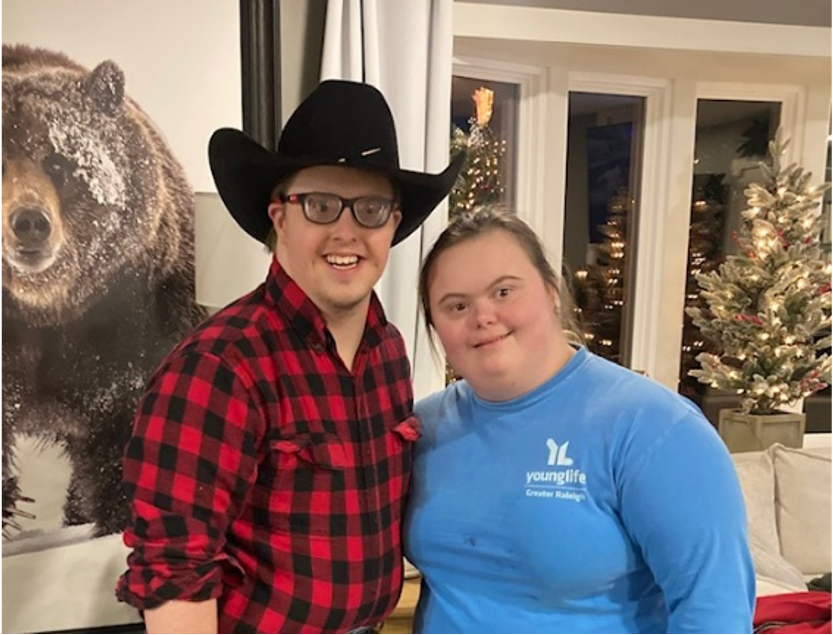 For me, Medicaid means I get to have a great life!I have big dreams.My Mom and Dad support me to reaching my dreams and goals.
For me, Medicaid means I get to have a great life!I have big dreams.My Mom and Dad support me to reaching my dreams and goals. 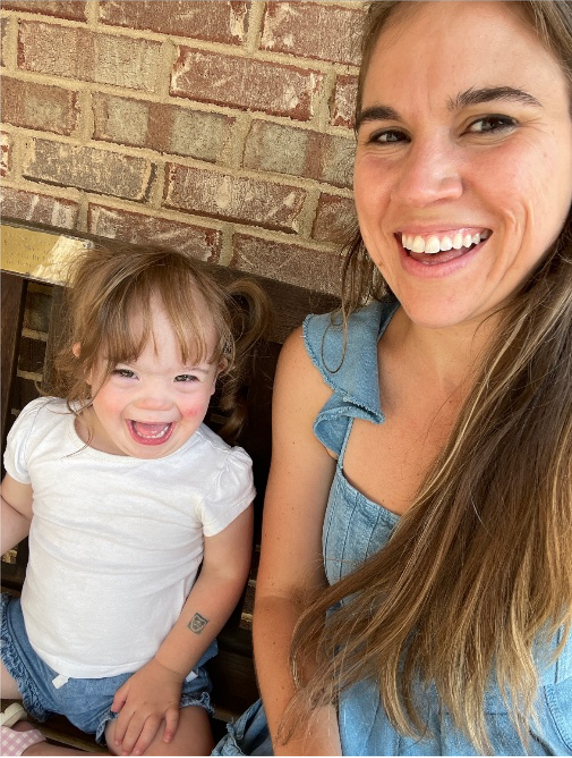 When you are a parent, you are usually forced to surrender some expectations little by little as your children grow up. Maybe they chose to play soccer when you thought they’d play football, or Duke instead of UNC. When you’re a parent of child with a disability, you are forced to surrender your expectations all at once, and over and over. When you get a prenatal diagnosis, it starts before they arrive. We drop our expectations early. But that is not to say we don’t have hope. We have a lot of hope. In fact, our hopes probably still look similar to other parents. We want our children to be able to have a job they like, a partner they love, a home they’re happy in, and hobbies they’re excited about. And when we hope for and dream about these things, we want to know there is scaffolding making it possible for these dreams to come true.
When you are a parent, you are usually forced to surrender some expectations little by little as your children grow up. Maybe they chose to play soccer when you thought they’d play football, or Duke instead of UNC. When you’re a parent of child with a disability, you are forced to surrender your expectations all at once, and over and over. When you get a prenatal diagnosis, it starts before they arrive. We drop our expectations early. But that is not to say we don’t have hope. We have a lot of hope. In fact, our hopes probably still look similar to other parents. We want our children to be able to have a job they like, a partner they love, a home they’re happy in, and hobbies they’re excited about. And when we hope for and dream about these things, we want to know there is scaffolding making it possible for these dreams to come true. 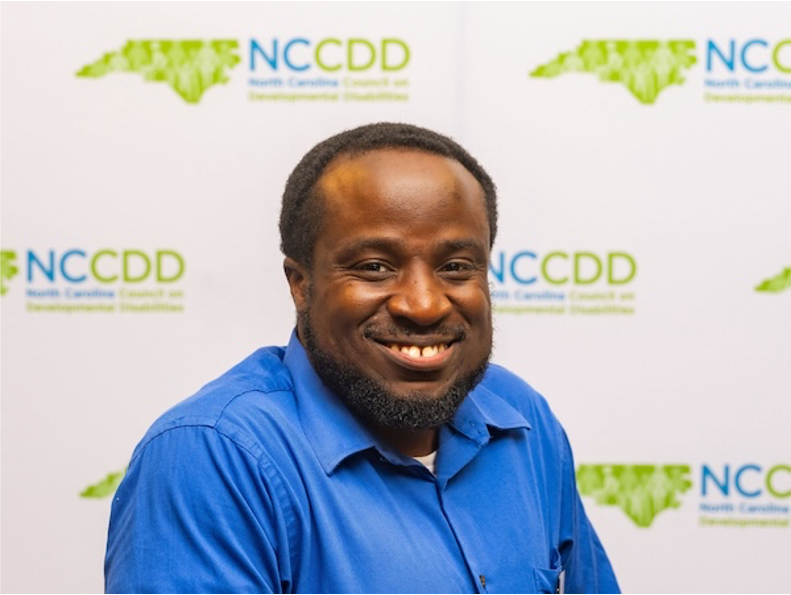 I have a passion for advocating for adults and children with disabilities, like myself.
I have a passion for advocating for adults and children with disabilities, like myself. 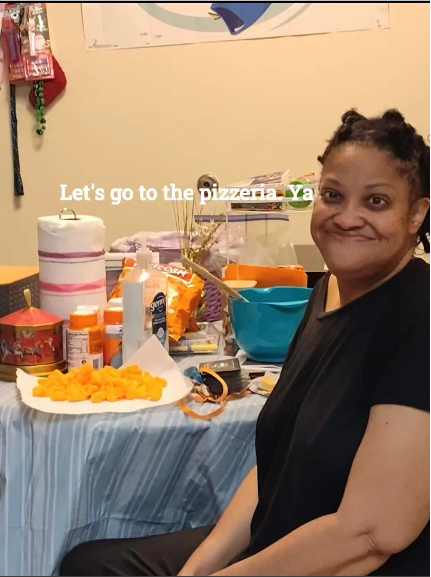 I moved into my current apartment in April 2021.I rented a room that was part of a residence and moved four times in two years while waiting to find a permanent place to live.I was on many housing waiting lists as well.Finally, I received help from someone at the Disability Rights & Resources Center for Independent Living in Charlotte.He was a true angel!
I moved into my current apartment in April 2021.I rented a room that was part of a residence and moved four times in two years while waiting to find a permanent place to live.I was on many housing waiting lists as well.Finally, I received help from someone at the Disability Rights & Resources Center for Independent Living in Charlotte.He was a true angel!